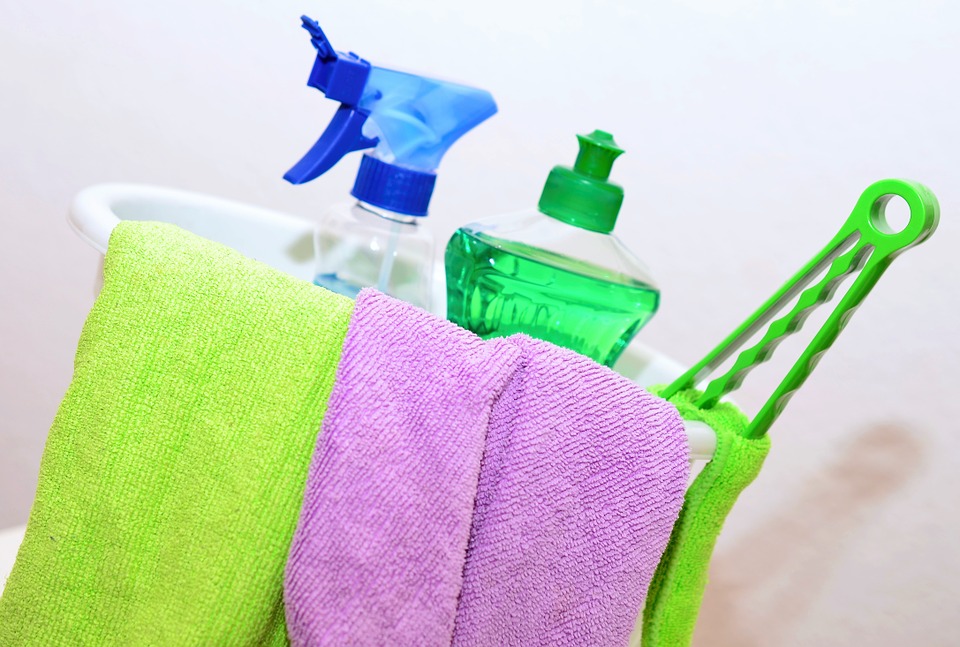
For those living a
green lifestyle, substitutes for household chemicals can be no further than your kitchen. Deep cleaning your house is a good way to keep your personal environment healthy, but many household cleaning products have harsh chemicals that you should avoid if you're trying to be eco-friendly.
While the cleaning product industry is regulated by the government, many hazardous ingredients are legal and not fully listed on bottles. For example, chemicals like formaldehyde are banned in other countries, but not in the U.S.
The next time you reach for that all-purpose cleaner, read the label and see what kind of harsh chemicals you could be spraying in your home.
Phthalates
Found in: Fragranced household products like air fresheners, dish soaps and even toilet paper. Unfortunately, because of proprietary laws, companies don't have to disclose what's in their fragrances so you won't see them on the labels; however, if you see the word "fragrance" on the label, chances are they're in there.
Risks: Phthalates are known endocrine disruptors. Although exposure mainly occurs through inhalation, it can also happen through skin contact with scented soaps. Unlike the digestive system, the skin has no safeguards against toxins so absorbed chemicals go straight to the organs.
Switch to: Whenever possible, switch to fragrance-free options or all-natural organic products. If you need to freshen the air, skip plug-in or aerosol air fresheners and use essential oils instead. Opening the windows is also a viable option that is just as effective (and it's free). Aerosol fresheners can also be migraine and asthma triggers so avoiding them can reduce discomfort. Also consider adding more plants which are natural air detoxifiers.
Triclosan
Found in: Most liquid dishwashing detergents, hand soaps and face washes listed as "antibacterial."
Health risks: Triclosan is an aggressive antibacterial agent that promotes the growth of drug-resistant bacteria. The EPA is investigating whether triclosan may also disrupt endocrine function and its carcinogenic properties.
Switch to: Simple detergents and soaps with short ingredients lists. Avoid antibacterial products with triclosan for home use. Choose a hand sanitizer that is alcohol-based without triclosan.
Ammonia
Found in: Polishing agents for bathroom fixtures, sinks and jewelry and is also found in glass cleaners.
Health risks: Because of the fact that ammonia doesn't leave streaks after it evaporates, it's a common ingredient in glass and window cleaners, but all that sparkle comes with a price. It's a powerful irritant that will affect those with asthma and elderly people with lung issues and breathing problems. People who end up with a lot of ammonia exposure can develop chronic bronchitis and asthma.
DO NOT MIX AMMONIA WITH BLEACH. It will create a poisonous gas.Switch to: Vinegar or vodka. Mix either liquid with distilled water and spray as you would a glass cleaner. It will produce a reflective shine on any metal or mirrored surface. Toothpaste can also be used to clean metal and jewelry.
Chlorine
Found in: Tap water, scouring powders, toilet bowl cleaners, mildew removers and laundry whiteners.
Health risks: Chlorine is introduced to tap water to get rid of bacteria so you're exposed during your showers or baths, but you're also exposed through fumes and possibly the skin when you clean with it. Health risks can be acute and they can be chronic. It can be a respiratory irritant at an acute level, but at the chronic level it can become affect the thyroid.
Switch to: Baking soda can be used for scrubbing. Vinegar can be used for cleaning toilet bowls and a combination of vinegar and borax is great for whitening clothes. Installing filters in your sinks and showers can help reduce the level in your water.
When cleaning your home try using some of these household products you may already own instead of using harsh chemicals:
- Baking soda - a great product for mild scrubbing and polishing
- Kosher salt - a more heavy duty abrasive for scrubbing
- Vinegar - natural alternative to ammonia
- Olive oil and mineral oil - perfect for furniture polish
- Lemon juice - alternative for deodorizing
Homemade cleaning formulas
- Glass, mirror and window cleanser - Mix two tablespoons of white vinegar with a gallon of distilled water and spray it onto the surface. Wipe away with newspaper to eliminate streaks.
- Mild cleanser - Mix baking soda with enough water to form a paste and use it to scrub sinks, countertops, porcelain and tile.
- Heavy-duty cleanser - Sprinkle kosher salt onto a wet sponge and use it to scrub stubborn stains on sinks, pots and pans.
- Furniture polish - Mix one cup of mineral oil with one cup of white vinegar and apply to wood furniture by rubbing on with a clean, soft cloth.
- Toilet bowl cleaner - Sprinkle some baking soda into the bowl and follow with some white vinegar. Scrub with a toilet brush to clean and deodorize. To eliminate rings, pour a cup of white vinegar in to the bowl and allow it to sit overnight before flushing.